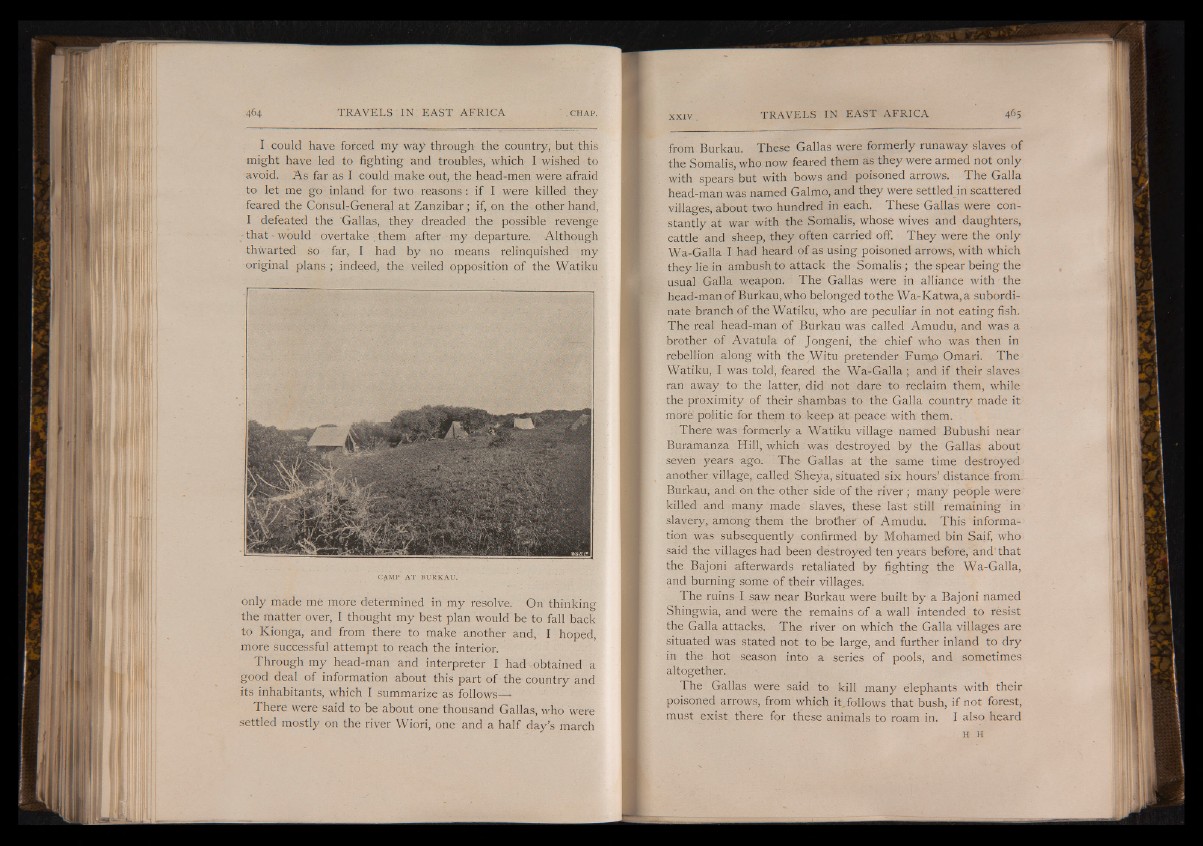
I could have forced my way through the country, but this
might have led to fighting and troubles, which I wished to
avoid. As far as I could make out, the head-men were afraid
to let me go inland for two reasons: if I were killed they
feared the Consul-General at Zanzibar; if, on the other hand,
I defeated the Gallas, they dreaded the possible revenge
that • would overtake , them after my departure. Although
thwarted so far, I had by no means relinquished my
original plans ; indeed, the veiled opposition of the Watiku
CAMP A T BURKAU.
only made me more determined in my resolve. On thinking
the matter over, I thought my best plan would be to fall back
to Kionga, and from there to make another and, I hoped,
more successful attempt to reach the interior.
Through my head-man and interpreter I had- obtained a
good deal of information about this part of the country and
its inhabitants, which I Summarize as follows-^
There were said to be about one thousand Gallas, who were
settled mostly on the river Wiori, one and a half day’s march
from Burkau. These Gallas were formerly runaway slaves of
the Somalis, who now feared them as they were armed not only
with spears but with bows and poisoned arrows. The Galla
head-man was named Galmo, and they were settled in scattered
villages, about two hundred in each. These Gallas were constantly
at war with the Somalis, whose wives and daughters,
cattle and sheep, they often carried off. They were the only
Wa-Galla I had heard of as using poisoned arrows, with which
they lie in ambush to attack the Somalis; the spear being the
usual Galla weapon. The Gallas were in alliance with - the
head-man of Burkau, who belonged tothe Wa-Katwa,a subordinate
branch of the Watiku, who are peculiar in not eating fish.
The real head-man of Burkau was called Amudu, and was a
brother of Avatula óf Jongeni, the chief who was then in
rebellion along with the Witu pretender Fumo Omari. The
Watiku, I was told, feared the Wa-Galla ; and if their slaves
ran away to the latter, did not dare to reclaim them, while
the proximity of their shambas to the Galla country made it
mòre politic for them to keep at peace with them.
There was formerly a Watiku village named Bubushi near
Buramanza Hill, which was destroyed by the Gallas about
seven years ago. The Gallas at the same time destroyed
another village, called Sheya, situated six hours’ distance from.
Burkau, and on the other side of the river ; many people were
killed and many made slaves, these last still remaining in
slavery, among them the brother of Amudu. This information
was subsequently confirmed by Mohamed bin Saif, who
said the villages had been destroyed ten years before, and'that
the Bajoni afterwards retaliated by fighting the Wa-Galla,
and burning some of their villages.
The ruins I saw near Burkau were built by a Bajoni named
Shingwia, and were the remains of a wall intended to resist
the Galla attacks. The river on which the Galla villages are
situated was stated not to be large, and further inland to dry
in tlie hot season into a series of pools, and sometimes
altogether.
The Gallas were said to kill many elephants with their
poisoned arrows, from which it„follows that bush, if not forest,
must exist there for these animals to roam in. I also heard
H H